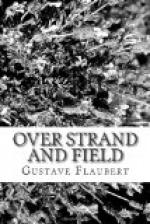Under one of the red cotton pillows I discovered a hideous object, a cap of the same color as the coverlet, but coated with a greasy glazing which prevented its texture from being recognisable; a worn, shapeless, clammy, oily thing. I am sure that its owner prizes it highly and that he finds it warmer than any other cap. A man’s life, the perspiration of an entire existence, is secreted in this layer of mouldy cerate. How many nights it must have taken to make it so thick! How many nightmares have galloped under this cap? How many dreams have been dreamed beneath it? And charming ones, too, perhaps,—why not?
If you are neither an engineer, nor a blacksmith, nor a builder, Brest will not interest you very much. The port is magnificent, I admit; beautiful, if you say so; gigantic, if you wish. It is imposing, you know, and gives the impression of a powerful nation. But those piles of cannons and anchors and cannon-balls, the infinite extension of those quays, which enclose a calm, flat sea that appears to be chained down, and those big workshops filled with grinding machinery, the never-ceasing clanking of galley chains, the convicts who pass by in regular gangs and work in silence,—this entire, pitiless, frightful, forced mechanism, this organized defiance, quickly disgusts the soul and tires the eye. The latter can rest only on cobblestones, shells, piles of iron, madriers, dry docks containing the naked hulls of vessels, and the grey walls of the prison, where a man leans out of the windows and tests the iron bars with a hammer.
Nature is absent and more completely banished from this place, than from any other spot on the face of the earth; everywhere can be seen denial and hatred of it, as much in the crowbar which demolishes the rocks, as in the sabre of the garde-chiourme who watches over the convicts.
Outside of the arsenal and the penitentiary, there is nothing but barracks, corps-de-garde, fortifications, ditches, uniforms, bayonets, sabres and drums. From morning until night, military music sounds under your windows, soldiers pass through the streets, come, go, and drill; the bugle sounds incessantly and the troops file past. You understand at once that the arsenal constitutes the real city and that the other is completely swallowed up by it. Everywhere and in every form reappear discipline, administration, ruled paper. Factitious symmetry and idiotic cleanliness are much admired. In the navy hospital for instance, the floors are so highly polished that a convalescent trying to walk on his mended leg would probably fall and break the other. But it looks nice. Between each ward is a yard, but the sun never shines in it, and the grass is carefully kept out. The kitchens are beautiful, but are situated so far from the main building that in winter the food must be cold before it reaches the patients. But who cares about them? Aren’t the saucepans like polished suns? We saw a man who had broken his skull in falling from a vessel, and who for eighteen hours had received no medical assistance whatsoever; but his sheets were immaculate, for the linen department is very well kept.




